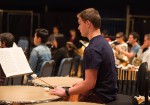Column Name
Title
First-year percussionist Joseph Bricker, who’s from Chicago, recounts the last day of Orchestra Orientation—the day on which the mostly freshmen ensemble works with Alan Gilbert for the first time. Gilbert, of course, is the music director of the New York Philharmonic as well as Juilliard’s director of conducting and orchestral studies; he leads the Juilliard Orchestra on November 24 in its annual Carnegie Hall concert.
Body
6:50am My overly abrasive alarm goes off—time to start thinking about getting out of bed. Something about getting up before 7 feels like I’m taking down a beast.
7:02am I didn’t conquer the beast—I get out of bed, disappointed with my lack of conviction.
7:20am Get dressed, snag a Tootsie Roll, and put on my preferred “wake up” playlist, starting with the Hall and Oates classic “You Make My Dreams,” which I then get sick of and switch to Brahms’s Fourth Symphony before our read [of the piece] later this morning. Music blasting, I grab my usual iced coffee and bagel from the cafeteria.
7:45am I barge into the percussion rooms, looking to eat my breakfast and do my morning warm-up before I move the drums into 543. But, as is the case with most Juilliard students, this time includes a lot of mindless Facebook browsing and pretending to warm up before I turn on my “Pop Songs Tempi 55-196” playlist and start doing my groove-out warm-up.
8:30am Once I feel loose and ready, I head up to the fifth-floor orchestra rehearsal room. The percussionists are responsible for moving the rehearsal drums from room to room, so I slide the drums in and let them adjust to the room, which is a tepid 76 degrees. I’m already sweating through my shirt.
9:24am The man of the hour, Alan Gilbert, walks in sporting the command of being a department head, the swag of being one of the best conductors of the world, and the friendliness of his small, green glasses. The orchestra tunes and Rob Ross [assistant dean for orchestral studies] introduces Mr. Gilbert, and we begin. In my previous first encounters with a new conductor, the maestro has frequently given the musicians a few words of wisdom before we just begin, but there’s no ceremony here.
9:48am The beginning of the Brahms Fourth has been described to me as “sounding as if it were in the middle of some other piece,” and the first minutes of the rehearsal on the first movement go by effortlessly. Many of the subsequent ones don’t. Some of the musicians don’t have as wide an orchestral background as I do (they have a lot of chamber or solo experience), so keeping everyone together in this massively energetic group—in a really hot room—is clearly a struggle, even for someone with as much experience as Gilbert has.
10:45am Half the rehearsal has gone by and we haven’t made it through the first movement, so we move on to the second, so I now have something to do besides sweat— I’m playing in the second and fourth movements and the other timpanist is doing the first.
12:15pm The reading winds up on a high note with the end of the symphony—at last the orchestra is beginning to sound like the Juilliard Orchestra. Me and my fellow percussionist put away the drums and head down to lunch. We attempt to process the nuggets of wisdom from the maestro, although we’re mostly just focused on food—in my case, sushi with potato chips and cherry Jell-O (strange, I know).
1:27pm I arrive at my Ear Training class for an hour of nervously waiting to sing in front of the class. It’s something all Juilliard musicians experience, but that doesn’t make it less nerve-racking.
2:31pm For the rest of the day, the percussion studio goes in and out of relaxing hang breaks and heavy-duty practice. Percussion ensemble rehearsals begin tomorrow for our October 21 concert in Tully. Now’s the time to take the culmination of Orchestra Orientation and put it into the rest of my endeavors at Juilliard. Mission accomplished, orchestra administration, mission accomplished.
4:28pm My first practice session of the day finishes— I was working on Graffitis for solo multi-percussion by Georges Aperghis, who’s best known for his Le Corps a Corps for solo performer. It mostly consists of talking with the audience in a completely made-up language while playing a drum, with some pretty physical techniques that in some performances end up with the performers bleeding on stage—it’s quite provocative. The piece I’m studying is a bit more toned-down—it’s centered on using the voice and the percussion instruments to convey a new language. You can find me on most days in a practice room practicing the most efficient way to speak 29 syllables, “do-i-vo-do-i-va-ki-va-han-io-la-vh,” in the space of one beat. I need to match a vocal vibrato on “vuh” to a cow’s moo toy. I think I’m losing my voice.
6pm Some of my fellow percussionists and I head to the cafeteria for dinner—Caesar salad with chicken from the grill, vegetable soup, and a bagel. Meals are some of my only times to get out of the percussion practice rooms (aside from rehearsals, class, and other necessities), so it’s a good way to see my other friends from around school.
7:30pm Starting my last practice session for today—mostly on the fugue from Bach’s First Violin Sonata. This fugue comes up all of the time on orchestral percussion auditions, and it’s just the sort of tricky and overall good piece to learn to get going at Juilliard. I’ve been here a month and I’m already working on several projects in and out of my lesson schedule. It’s stressful, but it’s good stress.
9pm Heading back to the dorm to do my music theory and ethics homework—classes start tomorrow at 9am! The days are full and the work is hard, but at the end of it all, I can wake up and know that I’m pursuing my dream. That’s my Juilliard day.






